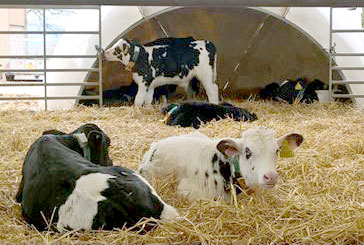Autumn/Winter Pneumonia Solutions
31 October 2022At this time of year, with the mild weather we have seen, weaning of spring born calves and the movement of these calves to markets and onwards to new homes, there is a higher risk of pneumonia occurring.
There are several factors that can cause pneumonia in calves, including the presence of bacteria and viruses, the environment and the immune status of the animal. Controlling the pneumonia requires using the environment and management to minimise the number and range of bugs and to maximise the immunity of the calf.
The only way to know which bugs are causing disease in your herd is to test. This is particularly useful when you have a disease outbreak and want to find the best response.
Symptoms of pneumonia include:
- Reduction in feeding
- Dull demeanour
- Dropping of the head
- Increased respiratory rate
- Nasal discharge
- Cough
- Raised temperature
- Occular discharge
Pneumonia can cause production losses as there is a reduction in liveweight gain and acute pneumonia may result in death. You should seek veterinary advice to discuss and investigate appropriate treatment, vaccination and management strategies.
When buying in stock, buy from a known source and from as few sources as possible to limit the chance of buying in the infection and spreading it to clean cattle.
Maximising immunity in cattle arriving on farm:
- Vaccinate cattle in line with the farm’s policy
- Ensure cattle are in a draught-free area with adequate ventilation to remove moisture.
- Provide plenty of dry straw to keep calves warm. Straw is the best bedding because it’s very absorbent and allows calves to nest
- Have a thermometer in the shed to check the temperature
- Don’t overstock
- Handle cattle quietly and gently to avoid stress
- Ensure cattle are receiving unrestricted water and access to palatable, rumen friendly diet
To ensure groups of animals have good immunity, consider the following:
Keep them in even batches – when batches are uneven in size and / or age the smaller, younger calves are always at increased risk of pneumonia
Keep them in stable batches – all in / all out group management reduces the risk of pneumonia compared to continuous throughout groups. Mixing lots of cattle from lots of different sources not only increases the range of bugs but reduces immunity through stress response
Keep them in smaller batches – when pneumonia rates are high reducing the group size can reduce the risk
Vaccination won’t eliminate the risk, but it will help the calf cope with the infection and get over it quicker. Eradicating BVD and IBR from your adult herd will also help.
Related FAS Materials
https://www.fas.scot/article/weaning-calves-reducing-the-stress/
https://www.fas.scot/publication/livestock-health-planning-over-the-winter/
Sign up to the FAS newsletter
Receive updates on news, events and publications from Scotland’s Farm Advisory Service

